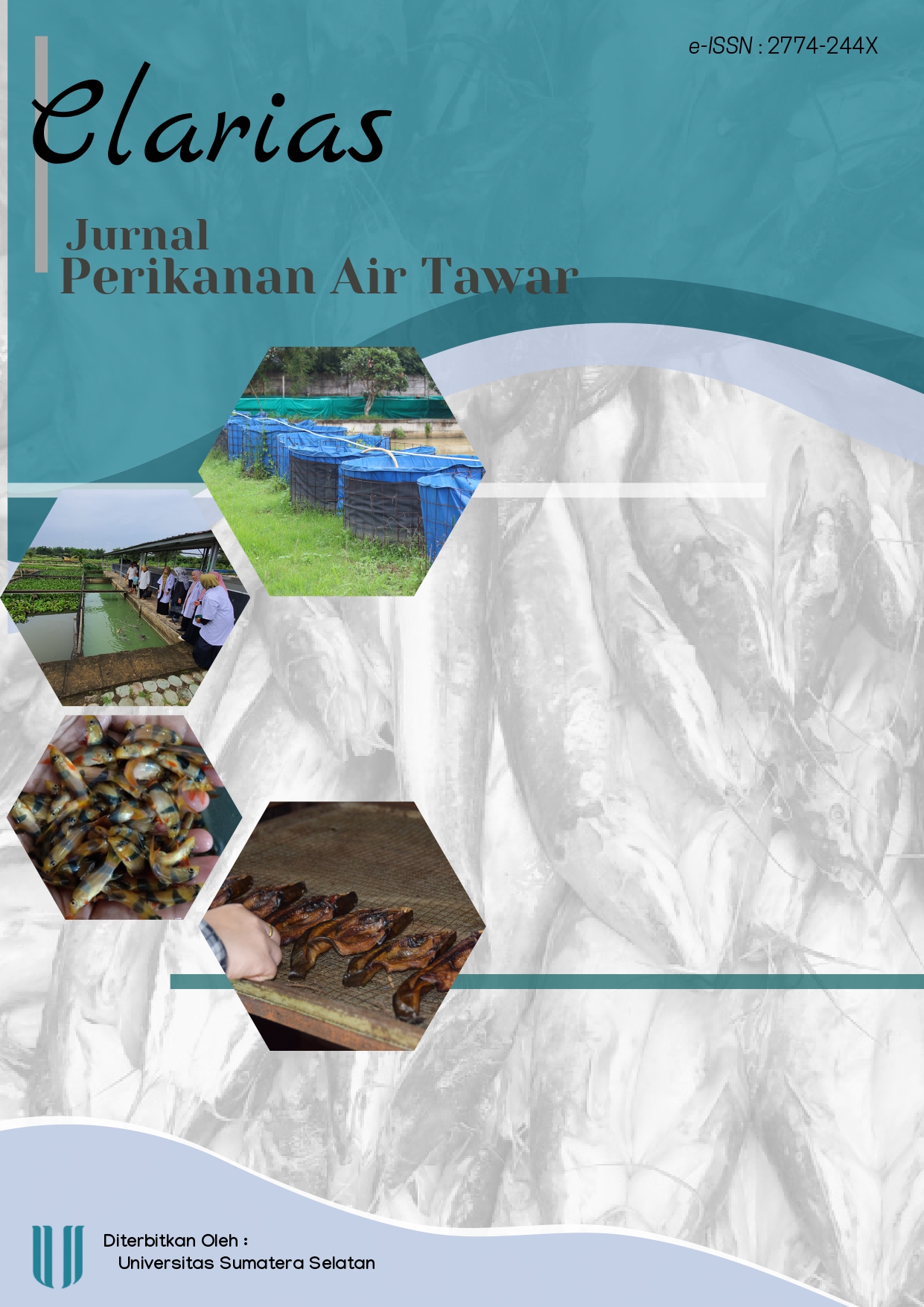Analisis Reaksi Maillard pada Pengawet Alami Pangan Kitosan Kombinasi Asap Cair Sekam Padi dengan Konsentrasi yang Berbeda
Keywords:
liquid smoke, chitosan, MaillardAbstract
Preservatives are becoming one of the more frequently used food additives. Natural preservatives are
needed to replace the use of formalin, which is hazardous to human health. One of the natural preservatives that
can be utilized is chitosan solution combined with rice husk liquid smoke. The chitosan solution combined with
rice husk liquid smoke with the addition of glucose and the sterilization process will produce a Maillard reaction
that functions to increase the effectiveness of antibacterial properties. The research objective was to determine
the level of browning of chitosan solution combined with rice husk liquid smoke as a natural food preservative.
The research method used a completely randomized design (CRD) with 5 treatments repeated three times. The
treatments used were: A0 (1% Chitosan + 1% Acetic Acid + 1% Glucose), A1 (1% Chitosan + 1% Acetic Acid
+ 1% Glucose + 1% Rice Husk Liquid Smoke), A2 (1% Chitosan + 1% Acetic Acid + 1% Glucose + 2% Rice
Husk Liquid Smoke), A3 (1% Chitosan + 1%s Acetic Acid + 1% Glucose + 4% Rice Husk Liquid Smoke), A4
(1% Chitosan + 1% Acetic Acid + 1% Glucose + 6% Rice Husk Liquid Smoke). The results showed that
chitosan combined with rice husk had a very significant effect on the browning index value. The higher the
concentration of liquid smoke, the higher the result of the browning index produced. The Maillard reaction
occurs due to the presence of aldehyde ketone compounds in the liquid smoke of rice husk meeting the free
amino acid compounds of chitosan and glucose in the heating process so that the Maillard reaction can take
place. The best concentration is treatment A4 which gets optimal results on the brownish index produced.
References
Asyfiradayati, R., Ningtyas, A., Lizansari, M., Purwati, Y., dan Winarsih, W. 2019. Identifikasi Kandungan Formalin pada Bahan Pangan (Mie Basah, Bandeng Segar dan Presto, Ikan Asin, Tahu) di Pasar Gede Kota Surakarta. Jurnal Kesehatan. 11(2):12-18.
Aryani, D. B. 2019. Kajian Penggunaan Kitosan dari Cangkang Rajungan (Portunus pelagius) sebagai Edible Coating untuk Memperpanjang Masa Simpan Fillet Ikan Nila. Doctoral dissertation, University of Muhammadiyah Malang.
Ginayati, L., dan M Faisal, S. 2015. Pemanfaatan Asap Cair dari Pirolisis Cangkang Kelapa Sawit sebagai Pengawet Alami Tahu. Jurnal Teknik Kimia USU. 4(3):7-11.
Girsang, D. Y., Rangga, A., dan Susilawati, S. 2014. Kasus Distribusi dan Penggunaan Formalin dalam Pengawetan Komoditi Ikan Laut Segar. Jurnal Teknologi dan Industri Hasil Pertanian. 19(3):218-228.
Kusumaningsih, P. 2022. Pengaruh Penambahan Kitosan Terhadap Cemaran Mikrobiologis Pada Abon Pindang Tongkol (Euthynnus affinis). Food Scientia: Journal Of Food Science and Technology. 2(1): 99-118.
Ina, Y. T., dan Sirappa, I. P. 2021. Pemanfaatan Cair Tempurung Kelapa Dan Pengaruhnya Terhadap Organoleptik Dan Kimiawi Daging Sapi. Jurnal Peternakan Nusantara, 7(1), 41-50.
Isnawati, N., Wahyuningsih, W., & Adlhani, E. 2015. Pembuatan Kitosan dari Kulit Udang Putih (Penaeus merguiensis) dan Aplikasinya sebagai
Pengawet Alami untuk Udang Segar. Jurnal Teknologi AgroIndustri, 2(2), 1-7.
Mardy, D. C., Sudjari, S., dan Rahayu, S. I. 2015. Perbandingan Efektivitas Kitosan (2-Acetamido-2-Deoxy-D- Glucopyranose) dan Nano Kitosan terhadap Pertumbuhan BakteriEnterococcus faecalis secara invitro. Majalah Kesehatan FKUB. 2(4):229-240.
Mardyaningsih, M., Leki, A., dan Rerung, O. D. 2014. Pembuatan Kitosan dari Kulit dan Kepala Udang Laut Perairan Kupang sebagai Pengawet Ikan Teri Segar. Jurnal Rekayasa Proses. 8(2), 69-75.
Rizqiyah, N., Karina, S., dan Musman, M. 2017. Uji Pendahuluan Kitosan pada Penyimpanan Ikan Layang (Decapterus macrosoma). Jurnal Ilmiah Mahasiswa Kelautan Perikanan Unsyiah, 2(4).
Saad M, Goh H, Rajikan R, Yusof T, Baharum S, dan Bunawan H. 2020. Uncaria gambir (W. Hunter) Roxb : From phytochemical composition to
pharmacological importance. Tropical j of pharmaceutical research. 19 (8) ;1767- 1773.
Sari, S. R., Baehaki, A., dan Lestari, S. D. 2013. Aktivitas antioksidan kompleks kitosan monosakarida (Chitosan Monossacharides Complex). Jurnal Fishtech. 2(1): 69-73.
Sari., S., Baehaki, A. dan Letari, S. 2013. Aktivitas Antioksidan Kompleks Kitosan Monosakarida (Chitosan Monossacharides Complex). Jurnal Fishtech. 2(1): 69-73. ttps://doi.org/10.36706/fishtech.v2i1.1 104.
Sari, S. R., Kanya, M. R., Rizki, R. R., Guttifera, G., dan Riswandi, A. 2023. Modifikasi Kitosan Asap Cair Cocos nucifera sebagai Pengawet Alami
Pangan (Antibakteri Staphylococcus aureus). Jurnal Perikanan Unram. 13(4): 951-957.
Wahjudi, T., Mustika, A., dan Haryono, N. 2017. Karang Taruna Dan Ibu PKK Sawahan Mojokerto dalam Memilih Makanan dari Hewan dan Tumbuhan yang Sehat, Halal, dan Bebas dari Cemaran Bahan Kimia Berbahaya untuk Meningkatkan Kualitas Kesehatan Masyarakat Indonesia. Jurnal Layanan masyasyarakat Universitas Airlangga. 1(2): 98-104.

Downloads
Published
How to Cite
Issue
Section
License

This work is licensed under a Creative Commons Attribution-ShareAlike 4.0 International License.
CC Attribution-ShareAlike 4.0






